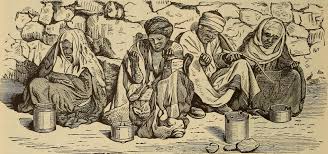
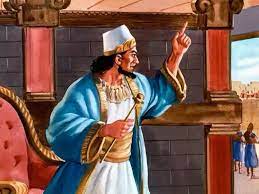 2 Kings 6:24-7:20: And it happened after this that Ben-Hadad king of Syria gathered all his army, and went up and besieged Samaria.
2 Kings 6:24-7:20: And it happened after this that Ben-Hadad king of Syria gathered all his army, and went up and besieged Samaria.
And there was a great famine in Samaria; and indeed they besieged it until a donkey’s head was sold for eighty shekels of silver, and one-fourth of a kab of dove droppings for five shekels of silver.
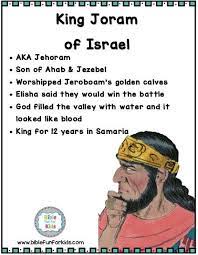 Then, as the king of Israel was passing by on the wall, a woman cried out to him, saying, “Help, my lord, O king!” And he said, “If the Lord does not help you, where can I find help for you? From the threshing floor or from the winepress?”
Then, as the king of Israel was passing by on the wall, a woman cried out to him, saying, “Help, my lord, O king!” And he said, “If the Lord does not help you, where can I find help for you? From the threshing floor or from the winepress?”
Then the king said to her, “What is troubling you?” And she answered, “This woman said to me, ‘Give your son, that we may eat him today, and we will eat my son tomorrow.’ So we boiled my son, and ate him. And I said to her on the next day, ‘Give your son, that we may eat him’; but she has hidden her son.”
Now it happened, when the king heard the words of the woman, that he tore his clothes; and as he passed by on the wall, the people looked, and there underneath he had sackcloth on his body. Then he said, “God do so to me and more also, if the head of Elisha the son of Shaphat remains on him today!”
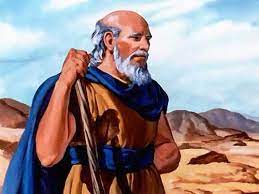 But Elisha was sitting in his house, and the elders were sitting with him. And the king sent a man ahead of him, but before the messenger came to him, he said to the elders, “Do you see how this son of a murderer has sent someone to take away my head? Look, when the messenger comes, shut the door, and hold him fast at the door. Is not the sound of his master’s feet behind him?” And while he was still talking with them, there was the messenger, coming down to him; and then the king said, “Surely this calamity is from the Lord; why should I wait for the Lord any longer?”
But Elisha was sitting in his house, and the elders were sitting with him. And the king sent a man ahead of him, but before the messenger came to him, he said to the elders, “Do you see how this son of a murderer has sent someone to take away my head? Look, when the messenger comes, shut the door, and hold him fast at the door. Is not the sound of his master’s feet behind him?” And while he was still talking with them, there was the messenger, coming down to him; and then the king said, “Surely this calamity is from the Lord; why should I wait for the Lord any longer?”
2 Kings 7:1 Then Elisha said, “Hear the word of the Lord. Thus says the Lord: ‘Tomorrow about this time a seah of fine flour shall be sold for a shekel, and two seahs of barley for a shekel, at the gate of Samaria.’ ” So an officer on whose hand the king leaned answered the man of God and said, “Look, if the Lord would make windows in heaven, could this thing be?” And he said, “In fact, you shall see it with your eyes, but you shall not eat of it.”
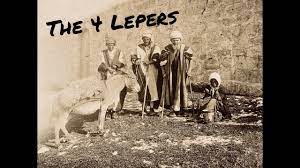 Now there were four leprous men at the entrance of the gate; and they said to one another, “Why are we sitting here until we die? If we say, ‘We will enter the city,’ the famine is in the city, and we shall die there. And if we sit here, we die also. Now therefore, come, let us surrender to the army of the Syrians. If they keep us alive, we shall live; and if they kill us, we shall only die.”
Now there were four leprous men at the entrance of the gate; and they said to one another, “Why are we sitting here until we die? If we say, ‘We will enter the city,’ the famine is in the city, and we shall die there. And if we sit here, we die also. Now therefore, come, let us surrender to the army of the Syrians. If they keep us alive, we shall live; and if they kill us, we shall only die.”
And they rose at twilight to go to the camp of the Syrians; and when they had come to the outskirts of the Syrian camp, to their surprise no one was there. For the Lord had caused the army of the Syrians to hear the noise of chariots and the noise of horses—the noise of a great army; so they said to one another, “Look, the king of Israel has hired against us the kings of the Hittites and the kings of the Egyptians to attack us!”
Therefore they arose and fled at twilight, and left the camp intact—their tents, their horses, and their donkeys—and they fled for their lives. And when these lepers came to the outskirts of the camp, they went into one tent and ate and drank, and carried from it silver and gold and clothing, and went and hid them; then they came back and entered another tent, and carried some from there also, and went and hid it.
Then they said to one another, “We are not doing right. This day is a day of good news, and we remain silent. If we wait until morning light, some punishment will come upon us. Now therefore, come, let us go and tell the king’s household.” So they went and called to the gatekeepers of the city, and told them, saying, “We went to the Syrian camp, and surprisingly no one was there, not a human sound—only horses and donkeys tied, and the tents intact.” And the gatekeepers called out, and they told it to the king’s household inside.
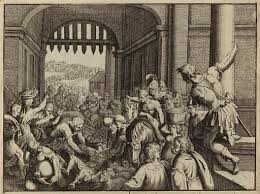 So the king arose in the night and said to his servants, “Let me now tell you what the Syrians have done to us. They know that we are hungry; therefore they have gone out of the camp to hide themselves in the field, saying, ‘When they come out of the city, we shall catch them alive, and get into the city.’ ”
So the king arose in the night and said to his servants, “Let me now tell you what the Syrians have done to us. They know that we are hungry; therefore they have gone out of the camp to hide themselves in the field, saying, ‘When they come out of the city, we shall catch them alive, and get into the city.’ ”
And one of his servants answered and said, “Please, let several men take five of the remaining horses which are left in the city. Look, they may either become like all the multitude of Israel that are left in it; or indeed, I say, they may become like all the multitude of Israel left from those who are consumed; so let us send them and see.” Therefore they took two chariots with horses; and the king sent them in the direction of the Syrian army, saying, “Go and see.” And they went after them to the Jordan; and indeed all the road was full of garments and weapons which the Syrians had thrown away in their haste. So the messengers returned and told the king. Then the people went out and plundered the tents of the Syrians. So a seah of fine flour was sold for a shekel, and two seahs of barley for a shekel, according to the word of the Lord.
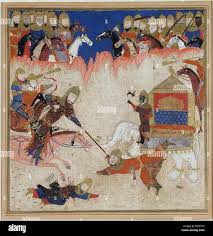 Now the king had appointed the officer on whose hand he leaned to have charge of the gate. But the people trampled him in the gate, and he died, just as the man of God had said, who spoke when the king came down to him.
Now the king had appointed the officer on whose hand he leaned to have charge of the gate. But the people trampled him in the gate, and he died, just as the man of God had said, who spoke when the king came down to him.
So it happened just as the man of God had spoken to the king, saying, “Two seahs of barley for a shekel, and a seah of fine flour for a shekel, shall be sold tomorrow about this time in the gate of Samaria.”
Then that officer had answered the man of God, and said, “Now look, if the Lord would make windows in heaven, could such a thing be?”
And he (Elisha) had said, “In fact, you shall see it with your eyes, but you shall not eat of it.”
And so it happened to him, for the people trampled him in the gate, and he died.
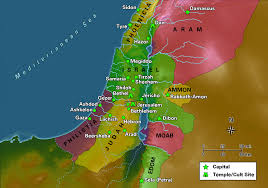
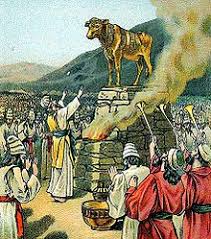 At this time in history, Israel was a divided nation with Benjamin and Judah centering their allegiance to Yahweh at Jerusalem where the great temple of Solomon stood. Ten Northern tribes, where the prophets Elijah and Elisha served, centered their religious loyalty around the worship of two golden calf statues located at Bethel and at Dan. A list of the kings in both groups shows that all the 19 kings in the North ignored God, while about 8 of the 20 kings in the South were in general sort of aligned with God. The course of the entire nation was a downhill spiral after Solomon died leading to the Northern kingdom being overrun by the Assyrians from the East in 722 BC, and Jerusalem being overrun in 586 BC by the Babylonians--with great loss of life and the destruction of the Temple of Solomon in 586 BC-- 327 years after the death of King Solomon.
At this time in history, Israel was a divided nation with Benjamin and Judah centering their allegiance to Yahweh at Jerusalem where the great temple of Solomon stood. Ten Northern tribes, where the prophets Elijah and Elisha served, centered their religious loyalty around the worship of two golden calf statues located at Bethel and at Dan. A list of the kings in both groups shows that all the 19 kings in the North ignored God, while about 8 of the 20 kings in the South were in general sort of aligned with God. The course of the entire nation was a downhill spiral after Solomon died leading to the Northern kingdom being overrun by the Assyrians from the East in 722 BC, and Jerusalem being overrun in 586 BC by the Babylonians--with great loss of life and the destruction of the Temple of Solomon in 586 BC-- 327 years after the death of King Solomon.
Israel is a model nation for other nations to learn from, since God deals with every nation in a similar manner. Our notions of progress, advancement, and upward evolution are illusory. Earth's residents are not good people, but selfish and self-serving. In general only a few respond to God's grace and love.
Elijah panicked after his confrontation with the prophets of Baal (1 Kings 17-19), fleeing from an angry Jezebel.
"And there he went into a cave, and spent the night in that place; and behold, the word of the Lord came to him, and He said to him, “What are you doing here, Elijah?” So he said, “I have been very zealous for the Lord God of hosts; for the children of Israel have forsaken Your covenant, torn down Your altars, and killed Your prophets with the sword. I alone am left; and they seek to take my life.” "...Yet I (God) have reserved seven thousand in Israel, all whose knees have not bowed to Baal, and every mouth that has not kissed him.”
Seven thousand believers in a nation of perhaps a million people is a very small remnant, yet God loved His people faithfully and He constantly strived to save them from themselves. (A larger remnant existed in Benjamin and Judah in the South. They survived an additional 136 years.)
In 2 Kings 6-7 we have the amazing record of Elisha dealing with the evil King Jehoram at Samaria after a terrible famine came upon the Northerners. It is important to grasp the context because the vignette recorded in 2 Kings 6 and 7 is amazing and instructive. The relevance to our current spiritual famine in America should be obvious.
A terrible famine has gripped the city of Samaria and the citizens were locked up in fear of the invading Syrian army. The heroes of this story are four unnamed lepers living outside the city gate in a homeless encampment. God in mercy uses these four outcasts to reverse the famine in a single day. The king survives God's relief and recovery (RnR) program, but his Number Two right hand man, who had defied the prophet, died in the foray while God rescued the whole city by grace and mercy alone. Those favored the most were the four lepers whom God used to being "good news" to everyone involved. The lesson for us today in our factioned, divided nation is probably best seen in the words of Jesus,
“You have heard that it was said, ‘You shall love your neighbor and hate your enemy.’ “But I say to you, love your enemies, bless those who curse you, do good to those who hate you, and pray for those who spitefully use you and persecute you, “that you may be sons of your Father in heaven; for He makes His sun rise on the evil and on the good, and sends rain on the just and on the unjust. “For if you love those who love you, what reward have you? Do not even the tax collectors do the same?“And if you greet your brethren only, what do you do more than others? Do not even the tax collectors do so? “Therefore you shall be perfect, just as your Father in heaven is perfect." (Matthew 5:44-48)
![]()
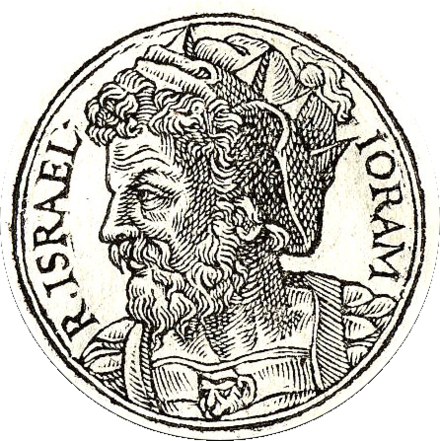 Joram (Jehoram) Son of Ahab and Jezebel: "Jehoram" ("Yahweh is Exalted") reigned 12 years in Israel (852-841 B.C.). His reign overlapped with Jehoshaphat and Jehoshaphat's son Jehoram's co-regency (853-848 B.C.) as well as Jehoram of Judah's sole reign (848- 841 B.C.). During these 12 years Elisha, whose name means "my God is salvation," was very active in Israel. In keeping with his theological purpose, the writer of Kings again emphasized incidents of spiritual significance that took place at this time.
Joram (Jehoram) Son of Ahab and Jezebel: "Jehoram" ("Yahweh is Exalted") reigned 12 years in Israel (852-841 B.C.). His reign overlapped with Jehoshaphat and Jehoshaphat's son Jehoram's co-regency (853-848 B.C.) as well as Jehoram of Judah's sole reign (848- 841 B.C.). During these 12 years Elisha, whose name means "my God is salvation," was very active in Israel. In keeping with his theological purpose, the writer of Kings again emphasized incidents of spiritual significance that took place at this time.
Unlike his predecessors, Jehoram did not worship Ba'al, and he removed the pillar of Baal, probably"Jehoram" ("Yahweh is Exalted") reigned 12 years in Israel (852-841 B.C.). His reign overlapped with Jehoshaphat and Jehoshaphat's son Jehoram's co-regency (853-848 B.C.) as well as Jehoram of Judah's sole reign (848- 841 B.C.). During these 12 years Elisha, whose name means "my God is salvation," was very active in Israel. In keeping with his theological purpose, the writer of Kings again emphasized incidents of spiritual significance that took place at this time. a special pillar which Ahab had erected near his palace at Jezreel for his own and Jezebel’s worship. However, the writer of 2 Kings says that he still "followed in the ways of Jeroboam, son of Nebat, who led the Israelites to sin." With Jehoshaphat of Judah, Jehoram attacked Mesha, King of the Moabites.
In the war between Aram-Damascus and Israel, Elisha befriended Joram, revealing to him the plans of the enemy. Subsequently, when BenHadad besieged Samaria, reducing the city almost to starvation and cannibalism, Jehoram sought to behead the prophet. The latter, however, foretold that a period of plenty was imminent; the siege was soon lifted, the city's food supplies were replenished, and the old relation between the king and the prophet was restored. (Wikipedia)
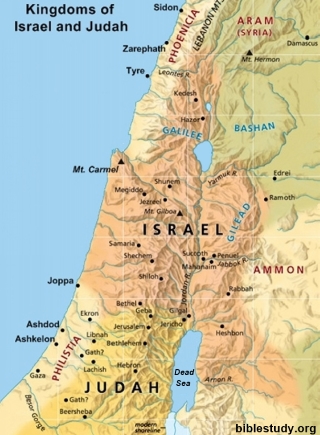 In 2 Kings Chapter 17 we have the record of how God's long patience with Israel was at last exhausted, and the divine stroke of judgment falls. During the nine-year reign of Hoshea, the last king of Israel, Shalmaneser V of Assyria, invaded Israel and besieged Samaria. After three years the city fell and the Assyrian king systematically deported the Israelites into various cities of Assyria and Media.
In 2 Kings Chapter 17 we have the record of how God's long patience with Israel was at last exhausted, and the divine stroke of judgment falls. During the nine-year reign of Hoshea, the last king of Israel, Shalmaneser V of Assyria, invaded Israel and besieged Samaria. After three years the city fell and the Assyrian king systematically deported the Israelites into various cities of Assyria and Media.
Careful assessment is made of the reasons for this overthrow of the people of God. Their persistent sins of pride, evil practices, and public idolatry are detailed, and especially set against the patient love of God who had warned them repeatedly through prophets and seers.
When the 10 tribes had been deposed, the Assyrian king attempted to repopulate the land of Israel with people from Babylon and other countries, who brought with them their own idols. Experiencing some difficulty in settling in the land, they blamed it on their ignorance of the God of Israel, and it is recorded that they "feared the Lord, and served their graven images" (17:41, KJV). This attempted religious mixture probably contributed to the enmity between the Jews and Samaritans which, centuries later, was recorded in the New Testament (see John 4). This is clear testimony to the folly of trying to mix the religion of man with divine revelation. The result is corruption worse than anything else. The Christian church can provide many examples of this principle.
We remember that the book of Kings began with the wonderful scene of Solomon, his kingdom at peace kneeling in his royal robes, praying to the God of heaven. Contrast this with the final scene when the Temple lay in ruins, the city was destroyed and the people were slaves and bondservants in a foreign country.
In this contrast we have a vivid picture of what happens in the human heart when it disobeys God. God's loving warnings are ignored for so long that God's patience draws to an end and disaster follows.
Let us never forget that as we read these books we must bear in mind the words of Paul in I Corinthians 10:11:
"Now these things happened [to Israel] as an example."
We have noted specific details of these from the various incidents we have covered, but even in the total picture there is a remarkable parallel.
From the very beginning of the monarchy there were two divisions within the nation.
Even under David this was true, for David was king only of Judah for seven years and it was only during the last 33 years of his life that he reigned over all 12 tribes. Thus a division between the 10 tribes of the north and the two tribes of Judah and Benjamin in the south existed from the start. But though there were two sections within the nation they were intended to worship only at Jerusalem and to be under the authority of only one king. Taken as a whole, therefore, it is evident that the nation of Israel represents the divisions of our humanity.
There are clearly two divisions in us: the outer man, consisting of the body, and the inner man, consisting of soul and spirit.
But in the capital city of Jerusalem the very essence of the nation was vested in the Temple wherein the living God dwelt. We know from the Scriptures that in the human life there is not only body and soul but within the soul, so closely linked with it that only the Word of God can divide between soul and spirit, is the spirit, the dwelling place of God. Thus the temple of the Spirit was in Jerusalem and all the worship of the kingdom was to be there.
In this picture, then, the 10 tribes of the north represent the body, while the two tribes of Judah and Benjamin in the south represent the human soul, and linked to the soul is the temple of the spirit where the Spirit of God Himself dwells. This is surely what the Lord Jesus had in mind when He said to the woman at the well of Samaria, "God is spirit; and those who worship Him must worship in spirit and truth" (John 4:24,).
We find many who worship him in soul, that is mere emotional worship. But God is not interested in that. He is looking for that worship which is centered in the deepest part of our nature--in the spirit.
In line with this, it is instructive to note that when the nation began to disintegrate, it was the 10 tribes of the north which fell apart first. It is amazing how early marks of sin begin to appear in the body when there is a dissolute and debauched way of life. Coarseness and vulgarity soon begin to mark the bodies of those who give themselves to overindulgence in food and drink and a debauched lifestyle. The body is the first to deteriorate, as Israel was the first to go in this record.
But Judah (depicting the soul, the personality), was next, arrested temporarily by the reformations we have noted. Ultimately, the kingdom declined until Judah too was carried away into captivity. For a few years the Temple remained in Jerusalem, but in the end it too was stripped and burned.
Thus the whole record is a picture of a wasted life. It is the picture of an individual who is a Christian but who has built upon the foundation of Christ with only wood, hay and stubble. Eventually the test of fire comes and only that which cannot be burned survives.
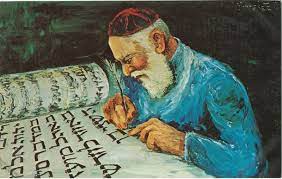
The Kings of Judah and Israel | A Harmony of Samuel, Kings and Chronicles | Second Kings Overview by Ray Stedman
Elijah and Elisha by Ray Stedman | Death of a Nation by Ray Stedman | Jezebel and Athaliah | Ancient Samaria

Lambert Dolphin's Main Library
Email is welcome: Lambert Dolphin
Archive for Newsletters
Library Annex (800+ new articles since 2018. Free, help thyself)
Audio Library (mp3)
My Search
Interviews

---------------------------------------------

| The Temple Mount in Jerusalem: (http://templemount.org)
For more information on the Temple Mount in Jerusalem, research concerning the location of the First and Second Temples and recent developments there see our separate web site. Maps and history of Jerusalem are brought up to date with MP3 lectures by leading scholars and research papers concerning the location of the Jewish Temples and plans for a Third Temple. Developed with the help of Mike Kollen, Jim Milligan and Norma Robertson. |
 |
August 22, 2020. March 29, 2022. September 5, 2022. June 3, 2023.
Search this site: